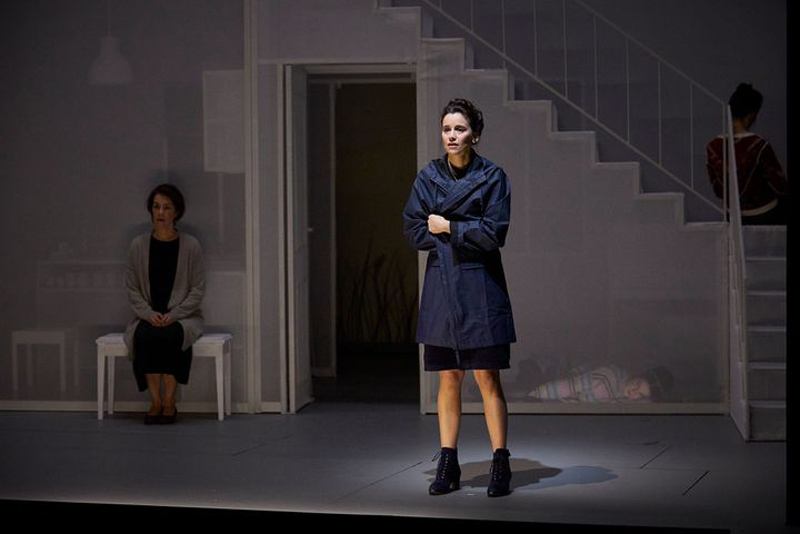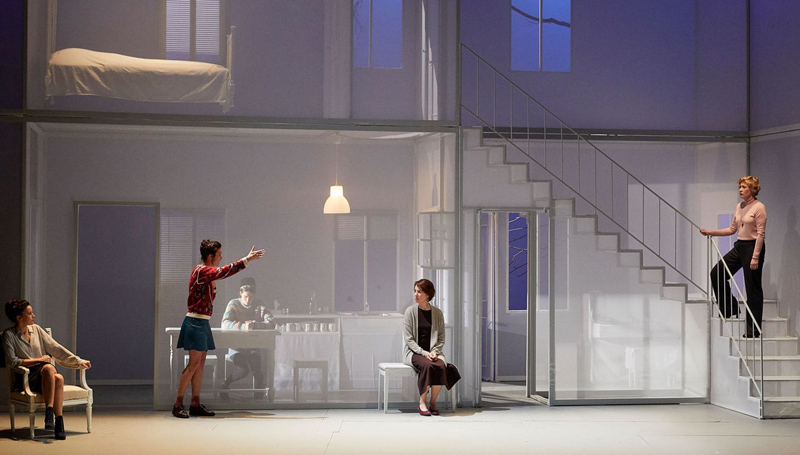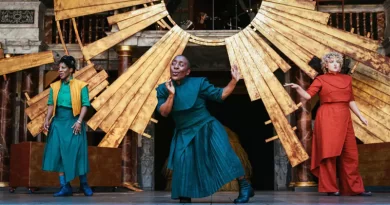“I Was In My House …”, Jean-Luc Lagarce
David Cowan in Paris
1 February 2018
Jean-Luc Lagarce’s play J’étais dans ma maison et j’attendais que la pluie vienne, (I Was In My House and I Waited for the Rain to Come), under Chloe Dabert’s direction at the the Comédie-Française, opens as a tableau. A woman is upstage, staring into the distance. Behind her are four women variously seated, standing, and lying down. Upstairs, through the transparent bedroom wall we see a bed with a slightly raised set of bedding. The names of the five women aren’t given; they are simply types: La Plus Vielle (the Oldest, perhaps a grandmother?), La Mère and three daughters or sisters, known as L’aînée (the Eldest Sister), La Seconde and La Plus Jeune. It is towards the end of summer, and the play takes us from the end of the afternoon to the following morning when the cool light of day returns, and the demons of the night have been dispelled. The action takes place on a single set. Pierre Nouvel has designed a dreamlike setting, a home with a minimalist design of white decor.

I Was In My House and I Waited for the Rain to Come.
Photo credit: Christophe Raynaud de Lage.
The Eldest Sister speaks first, for in many ways this is a succession of monologues: “I was in my house, and I waited for the rain to come. I looked at the sky as I always do, as I have always done … I was waiting. Haven’t I always waited?” When I read the play beforehand, the opening brought to mind the wistful but ominous opening of Daphne du Maurier’s Rebecca: “Last night I dreamt I went to Manderley again. It seemed to me I stood by the iron gate leading to the drive, and for a while I could not enter, for the way was barred to me.” However, it was not wistfulness that marked the opening monologue here. The monologue was delivered at full speed, the Eldest Sister almost gasping for breath as she tells of what she sees and what she thinks.
We learn of the return of her ill brother, whom we never see. He is back from his wars and life’s battles, returning home to where it all started so that he may die there. Though he is never seen, he is ever-present. The women have waited for years, living for this moment when the son, the brother, returns. He is a prodigal who has fallen back into their arms but has little time to live. A prodigal who may or may not be sleeping upstairs — perhaps the bedding is raised because it is covering him or perhaps it is merely suggestive. He is very much at the centre. There are only the women. The father is dead; it was he who had chased his son out of the house some years earIier. The son, having returned home to die, places the women almost in a state of being at a wake.
J’étais dans ma maison et j’attendais que la pluie vienne premiered in 1997 at the Théâtre Vidy-Lausanne directed by Joel Jouanneau, then at the Théâtre Ouvert directed by Stanislas Nordey. Now the Comédie-Française has brought it to its Théâtre du Vieux-Colombier. In the direction by Chloe Dabert, a student of Joelle Jouanneau, we traverse the poetic landscape of a death. The sense of loss looms, and the frustrations of the past are rehearsed in monologue. Each woman draws a verbal portrait to prepare for the death and the mourning that will surely follow.
The Eldest Sister is played by Suliane Brahim, an exceptional and charismatic actor. She is in turns flippant, ironic, humorous and angry. Her last monologue reaches out to the audience, asking them to share her pain with sheer intensity. Clotilde Bayser played with depth and great resonance the emotionally distraught Mother who is facing a mother’s tragedy and great loss. Jennifer Decker is the Second Sister, and it is Decker and Brahim who have the most strident, cruel and moving exchanges. In one of the more protracted dialogues, as opposed to the monologues, The Second Sister asks her Eldest Sister simply, “Did you have men?” The Eldest Sister responds by talking not only of her loves but also, bitterly and cruelly, of her provincial life as a teacher who teaches “foolish kids the basics of nothing’.’ Rebecca Marder is the Youngest, who, as we would expect from the youngest, ends up the one who loses her composure, emotionally breaking free of the pact of the wake. She was too young when her brother left to remember him, and she feels ignored sitting in her corner – but she does remember the anger of her father; she understood the violence of the parting. Brune as the Oldest provides a subtle balance to the claustrophobic emotional dissonance between the other women.

I Was In My House and I Waited for the Rain to Come.
Photo credit: Christophe Raynaud de Lage.
The play is the penultimate work of Jean-Luc Lagarce, a French actor, director, and playwright. Written in 1994, a year before he died of AIDS in 1995 aged thirty-eight, it is one of three testamentary works, sitting between Juste la fin du monde (It’s Only the End of the World) in 1990 and Le Pays lointain (The Far-away Country) in 1995). Lagarce has been rediscovered by a new generation of French directors. Last year, Juste la fin du monde was released as a film directed by Xavier Dolan. It is the story of a son returning home to announce his illness to his family after years of absence, but he ends up leaving again without revealing the truth. Knowing that the trilogy of plays was written by Lagarce as he was dying makes the drama more tragic and touching. As he was writing, Lagarce was playing out his own life story – he wrote of these women who imagine what they will do and how they will feel after the death of the son/brother knowing his family would go through similar responses to his death.
The early works of Lagarce have been criticized as derivative of Eugene Ionesco and Samuel Beckett. In J’étais dans ma maison et j’attendais que la pluie vienne, however, Lagarce gives us echoes of Anton Chekhov. This is a slice of life, a happening where not much happens. Explicit reference is made to the “three sisters’: and of course there are three sisters in the play, but in an intense monologue when one of the women protests by stating, “When we are old … “ it references the final scene of Uncle Vanya: “Well what can we do? We must go on living. We shall go on living, Uncle Vanya.”
J’étais dans ma maison et j’attendais que la pluie vienne described as a pavane, and in the sequence of monologues where the women change places, almost as if they were taking turns, this processional form of dance is evoked. There is a sense in which the actors are up for “their turn’,’ as the choreography brings the next character to another place on the stage to give a long monologue directed at the other women. However, despite the sense of “my turn now’, ‘this is largely a smooth and intriguingly choreographed piece. We have peered into the white house and its desolation, and we are all waiting for the rain.









